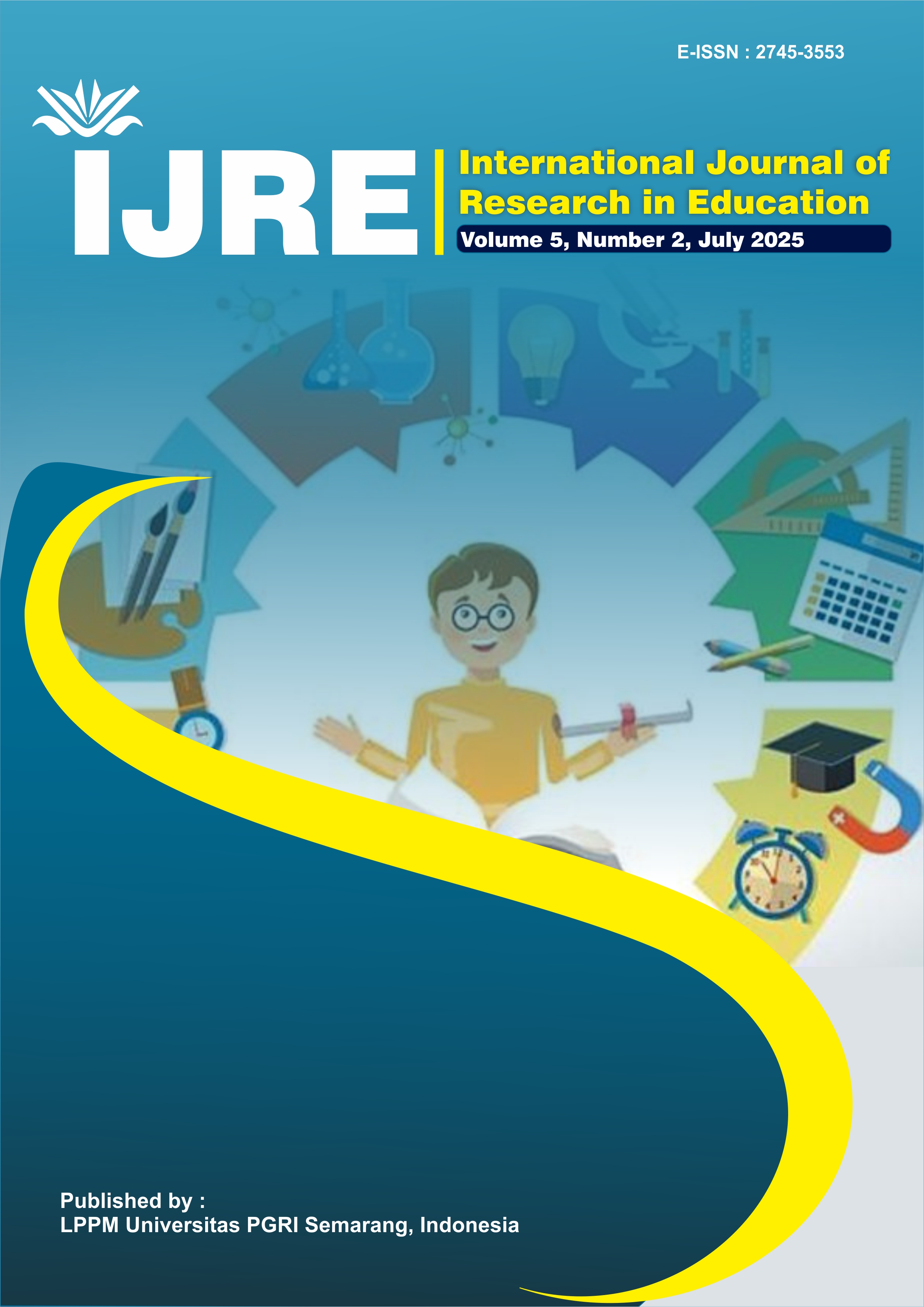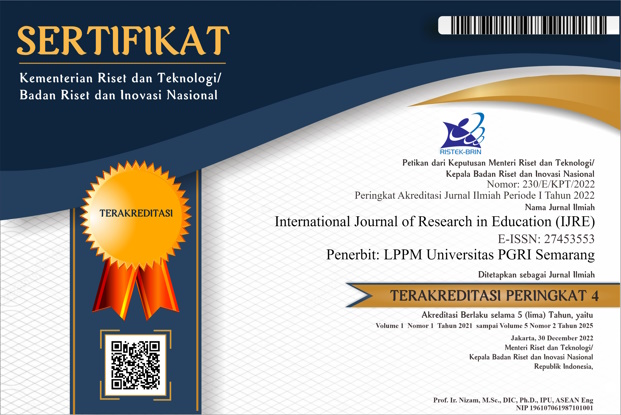The Effect of Inquiry-Based Learning on the Critical Thinking Skills of Eleventh-Grade Social Science Students in Economics
DOI:
https://doi.org/10.26877/hwrzec22Keywords:
Inquiry Methode, Learning Outcomes, Critical ThinkingAbstract
This study was conducted to highlight the importance of enhancing students' critical thinking skills through effective teaching methods. Using a quasi-experimental design with a post-test approach, the research involved 36 eleventh-grade students from MA Salafiyah Syafi'iyah, divided into an experimental group and a control group. The study aimed to examine the impact of the Inquiry-Based Learning (IBL) method on students’ critical thinking abilities in economics. Descriptive and statistical analyses were used to evaluate the data. Results showed a clear difference between the two groups: the control class had an average score of 63.89, while the experimental class, which applied the IBL method, achieved an average of 88.29. A paired samples test showed a Sig. (1-tailed) value of 6.664 > 0.005, indicating a statistically significant improvement. These findings demonstrate that the IBL method effectively enhances students' critical thinking skills compared to traditional teaching methods. The implication of this study is that adopting inquiry-based approaches in economics education can foster deeper understanding and better cognitive engagement among students.
References
Aldridge, V. K., Dovey, T. M., & Wade, A. (2017). Assessing test-retest reliability of psychological measures: Persistent methodological problems. European Psychologist, 22(4), 207–218. https://doi.org/10.1027/1016-9040/A000298
Altman, D. G., & Bland, J. M. (1983). Measurement in Medicine: The Analysis of Method Comparison Studies. The Statistician, 32(3), 307. https://doi.org/10.2307/2987937
Arifin, Z., Saputro, S., & Kamari, A. (2025). The effect of inquiry-based learning on students’ critical thinking skills in science education: A systematic review and meta-analysis. EURASIA Journal of Mathematics, Science and Technology Education, 2025(3), 2592. https://doi.org/10.29333/ejmste/15988
Arikan, S., Kilmen, S., Abi, M., & Üstünel, E. (2019). An example of empirical and model based methods for performance descriptors: English proficiency test. Journal of Measurement and Evaluation in Education and Psychology, 10(3), 219–234. https://doi.org/10.21031/EPOD.477857
Azmi, R. H. U., & Kurniawan, R. Y. (2025). Empowering student critical thinking skills: how guided inquiry enhances critical skills in economics. JURNAL EDUSCIENCE, 12(1), 37–49. https://doi.org/10.36987/JES.V12I1.6560
Bland, J. M., & Altman, D. G. (1999). Measuring agreement in method comparison studies. Statistical Methods in Medical Research, 8(2), 135–160. https://doi.org/10.1191/096228099673819272
Chu, S. K. W., Reynolds, R. B., Tavares, N. J., Notari, M., & Lee, C. W. Y. (2017). Introduction. 21st Century Skills Development Through Inquiry-Based Learning, 3–16. https://doi.org/10.1007/978-981-10-2481-8_1
Facione, P. A. (2023). Critical Thinking: What It Is and Why It Counts. Insight Assessment. https://www.researchgate.net/publication/251303244_Critical_Thinking_What_It_Is_and_Why_It_Counts
Ghaemi, F., & Mirsaeed, S. J. G. (2017). The Impact of Inquiry-based Learning approach on Critical Thinking Skill of EFL Students. EFL JOURNAL, 2(2). https://doi.org/10.21462/EFLJ.V2I2.38
Han, F., & Ellis, R. A. (2021). Predicting students’ academic performance by their online learning patterns in a blended course: To what extent is a theory-driven approach and a data-driven approach consistent? . Educational Technology & Society, 24(1), 191–204. https://www.researchgate.net/publication/348945525_Han_F_Ellis_R_A_2021_Predicting_students’_academic_performance_by_their_online_learning_patterns_in_a_blended_course_To_what_extent_is_a_theory-driven_approach_and_a_data-driven_approach_consistent_Ed
Hanif, I. F. (Irsyad), Zebua, Y. (Yuniman), & Pitriyani, P. (Pitriyani). (2022). The Effect of Price, Promotion Social Media and Product QualityOn Income Business of Screen Printing 289 Farhan Design. International Journal of Science, Technology & Management, 3(2), 363–367. https://doi.org/10.46729/IJSTM.V3I2.493
Hwang, G.-J., Lai, C.-L., & Wang, S.-Y. (2015). Seamless flipped learning: a mobile technology-enhanced flipped classroom with effective learning strategies. Journal of Computers in Education 2015 2:4, 2(4), 449–473. https://doi.org/10.1007/S40692-015-0043-0
Fraenkel, J. R., Wallen, N. E., & Hyun, H. H. (2017). How to Design and Evaluate Reseach in Education (8th ed.). McGraw-Hill. https://saochhengpheng.wordpress.com/wp-content/uploads/2017/03/jack_fraenkel_norman_wallen_helen_hyun-how_to_design_and_evaluate_research_in_education_8th_edition_-mcgraw-hill_humanities_social_sciences_languages2011.pdf
Jariyah, I. A., & Husamah, H. (2024). Prisma Sains: Jurnal Pengkajian Ilmu dan Pembelajaran Matematika dan IPA IKIP Mataram. 12(1), 2540–7899. https://doi.org/10.33394/j-ps.v12i1.9183
Creswell, J. W., & Creswell, J. D. (2018). Research design: Qualitative, quantitative, and mixed methods approaches (5th ed.).
Kaçar, T., Terzi, R., Arikan, rfan, & Kirikçi, A. C. (2021). The Effect of Inquiry-Based Learning on Academic Success: A Meta-Analysis Study. International Journal of Education and Literacy Studies, 9(2), 15–23. https://doi.org/10.7575/aiac.ijels.v.9n.2p.15
Khatib Sulaiman, J., Eka Putri, Y., Jalinus, N., & Abdullah, R. (2024). An Effectiveness of Using Inquiry-Based Learning Models on Student Learning Outcomes: Meta Analysis. The Indonesian Journal of Computer Science, 13(2). https://doi.org/10.33022/IJCS.V13I2.3935
Maharani, N. I., Dasna, I. W., & Utama, C. (2023). The Effectiveness of Inquiry-Based Learning Instrument to Enhance Student’s Critical Thinking Skills. Madrasah: Jurnal Pendidikan Dan Pembelajaran Dasar, 15(2), 66–77. https://doi.org/10.18860/MAD.V15I2.18682
Meng, F., & Jumaat, N. F. B. (2024). The Effectiveness of an Online Inquiry-Based Learning Environment towards Secondary School Students’ Behavioral Engagement and Performance in Science. International Journal of Interactive Mobile Technologies (IJIM), 18(18), 112–124. https://doi.org/10.3991/IJIM.V18I18.50547
Muzanni, A., Rahayu, Y. S., Supardi, Z. A. I., & Jayanti, P. (2018). The Effectiveness of Guided Inquiry-Based Learning to Train Critical Thinking Skills in High School Level. Proceedings of the 2nd Social Sciences, Humanities, and Education Conference.
Presnillo, J., & Aliazas, J. V. (2024). Inquiry-Based Learning For an Enhanced Students’ Engagement And Critical Thinking Skills In Biology. 10. https://doi.org/10.5281/ZENODO.10947598
Setiyaningsih, L. B., Riandi, R., Amprasto, A., & Mardiyah, M. (2024). Application of the Inquiry-Based Learning Model with Education for Sustainable Development to Enhance Critical Thinking Skills and Sustainable Awareness. Jurnal Penelitian Pendidikan IPA, 10(10), 7790–7802. https://doi.org/10.29303/JPPIPA.V10I10.8943
Topps, D., & Cullen, M. (2019). Scalable Use of Big Data Analytics in Small Group Learning. MedEdPublish, 8, 138. https://doi.org/10.15694/MEP.2019.000138.1
Zafra-Gómez, J. L., Román-Martínez, I., Gómez-Miranda, M. E., Zafra-Gómez, J. L., Román-Martínez, I., & Gómez-Miranda, M. E. (2015). Measuring the impact of inquiry-based learning on outcomes and student satisfaction. Assessment and Evaluation in Higher Education, 40(8), 1050–1069. https://doi.org/10.1080/02602938.2014.963836



